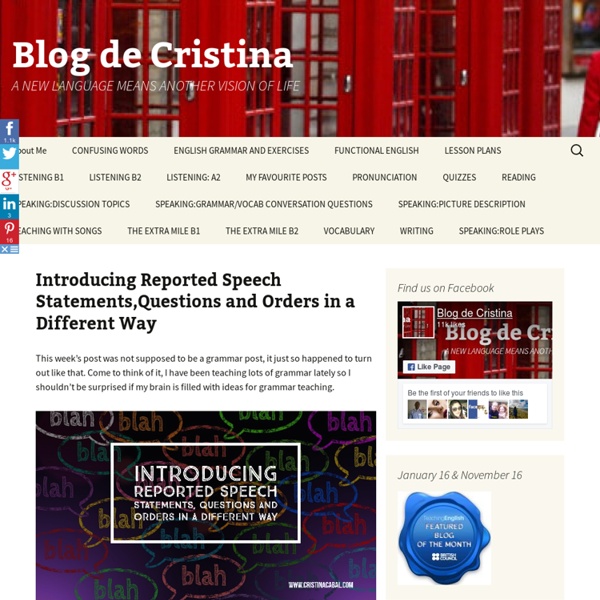Introducing Reported Speech Statements,Questions and Orders in a Different Way

http://www.cristinacabal.com/?p=9003
Related: grammar
• grammar
Relative Pronouns with comics and jokes: who, which, that, when and where
We use relative clauses to provide more information about a person, a thing or a place. We use WHO to give more information about people. We use WHICH when we want to provide more information about a thing.
ING gerunds vs. infinitive game
ING gerunds vs. infinitive : Practice ING gerunds vs. infinitive using this ESL fun Game.This game is also excellent for classroom teaching. Teachers can engage students in a classroom vocabulary or grammar review. It is suitable for intermediate and advanced esl learners. It can be used to energize a dull class, to review work that was done or simply as a reward for good classroom work.
24 defining and non-defining relative clause games
1. Trivia sentence building challenge Give or brainstorm a list of things that trivia questions are often about, e.g. the Amazon, the Statue of Liberty and Einstein. Students should choose one of the things from the list and say something true about that thing or person, e.g. “The Amazon is in South America”.
1 WORKSHEET – 10 GAMES
Make drilling more meaningful and fun. All you need is a sheet of paper. This post shows how the use of game mechanics can help a teacher design better drilling activities and turn repeated practice of target grammar or vocabulary into a cognitively engaging exercise.
Simple grammar rhymes
Beginners have to memorise a lot of new words and grammar. To make the process a bit easier, I and my colleague came up with a set of simple grammar rhymes that help our learners remember the crucial verb forms. ADVERT:
Four speaking activities
In this post, I would like to share four speaking activities that worked very well in my classes. There are two games to practise comparatives and superlatives and two activities to practise describing people. Four speaking activities – Superlatives and comparatives The first two activities help your students practise the usage of comparatives and superlatives. The first one is a simple board game.
Verb master board game
Verb master board game is intended to replace drills. The aim of this game is to help students learn to form verb tenses. While drills are boring, board games are interesting and fun. Thus, students practise the grammar forms and enjoy it.
Learn English Grammar with Pictures: 15+ Grammar Topics - ESL Buzz
In this lesson, you will learn English grammar with the following topics: English Grammar Topics WILL – WOULD – SHALL – SHOULDMUCH – MANY – A LOT OF – LITTLE – FEWSOME – ANYComma Rules in EnglishConditional Sentence Type 3English Verb Tenses in One TableBackshift of TensesLooking at the Future from the Past – Which Tense do We Need?Present Continuous vs. Present SimpleFuture Tenses: Will vs. Be going ToActive vs.
Learn English Modal Verbs
Englishmodal verbs are special verbs that are used to show possibility, ability, permission, and so forth. Click Here for Step-by-Step Rules, Stories and Exercises to Practice All English Tenses Examples: "It might rain" – shows possibility. "I can juggle" – shows ability. "You may sit down" – shows permission.
Irregular verbs in English - picture rhymes
Irregular verbs in English are forever. No matter how you teach them, the students resist. I have already designed about twelve different ways to teach irregular verbs and my students still struggle.
Reported speech and creative writing: Fifty ways – On the same page
After reading the reported conversation and discussing what it is about, the students practise simple reported speech structures by rewriting each line into direct speech while changing tenses, pronouns, possessive adjectives and time references when necessary. With the aid of a few extra words provided, the result will be the actual lyrics from “Fifty Ways to Leave Your Lover” by Paul Simon. The students listen to the song and check their answers at the end. The class can then work together and write a few more “ways to leave your lover”, following the model in the chorus. The students first choose one of the one-syllable proper names in the circle and match it with any words that rhyme in the box on the right. They then write their own lines, such as “Go to the gym, Tim”, “Don’t pull my leg, Meg”, “Get on that van, Dan”, or “Let’s make a deal, Neil”.
Related:



